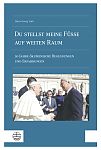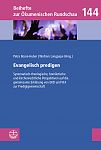on Character Formation, Ethical Education, and the Communication of Values in Late Modern Pluralistic Societies
Piet Naudé | Michael Welker | John Witte, Jr. (Eds.)
Hier geht es zur Leseprobe.
In our late modern societies, a tension arises between an almost chaotic pluralism and relativism on the one hand and a »constructive plurality« on the other. The latter acknowledges the normative codes emanating from key social systems like law, religion, the family, education, the market, the media, the academy (sciences and humanities), health care, and defence and politics.
In this volume, a multi-disciplinary team of experts from Germany, Italy, Australia, the UK, the USA, and South Africa bring their conceptual, empirical and historical insights to bear in three broad sections: »The moral dimension of social systems«; »The interaction of religion, law and education with political systems«; and »The moral (mal)-formation evident in case studies on the global financial crisis and social media«.
[Der Einfluss der politischen Ökonomie auf Charakterbildung, ethische Bildung und Wertevermittlung in spätmodernen pluralistischen Gesellschaften]
In unseren spätmodernen Gesellschaften entsteht eine Spannung zwischen einem fast chaotischen Pluralismus und Relativismus einerseits und einer »konstruktiven Pluralität« andererseits. Letztere erkennt die normativen Kodizes an, die von zentralen Gesellschaftssystemen wie Recht, Religion, Familie, Bildung, Markt, Medien, Akademie (Wissenschaften), Gesundheitswesen sowie Verteidigung und Politik ausgehen.
In diesem Band bringt ein multidisziplinäres Expertenteam aus Deutschland, Italien, Australien, Großbritannien, den USA und Südafrika seine konzeptionellen, empirischen und historischen Erkenntnisse ein in drei große Abschnitte: »Die moralische Dimension sozialer Systeme«; »Die Wechselwirkung von Religion, Recht und Bildung mit politischen Systemen« und »Die moralische (Fehl-)Bildung, die sich in Fallstudien zur globalen Finanzkrise und zu sozialen Medien zeigt«.






